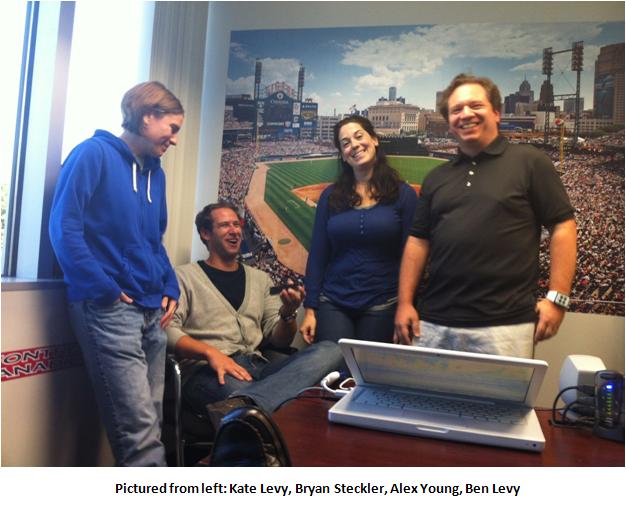In the wake of the Facebook IPO debacle, a lot has been written about Mark Zuckerberg’s philosophy, “The Hacker Way.” Lori Lewis uses it extensively in her talks and presentations because it represents insights into the way the Facebook platform is constructed.
 The idea behind “The Hacker Way” revolves around Facebook’s goal of accomplishing social good and connecting people and communities, ahead of profit. A recent blog post from Greg Satell’s “Digital Tonto” talks about the dichotomy between Wall Street and companies like Google and Facebook when it comes to seeing eye-to-eye about financial issues like shareholder value and ROI.
The idea behind “The Hacker Way” revolves around Facebook’s goal of accomplishing social good and connecting people and communities, ahead of profit. A recent blog post from Greg Satell’s “Digital Tonto” talks about the dichotomy between Wall Street and companies like Google and Facebook when it comes to seeing eye-to-eye about financial issues like shareholder value and ROI.
Satell sees this rift as being generational. And he refers to the pursuit of “questing” which runs counter to the idea of goal-setting and succinct deadlines. In essence, “The Hacker Way” suggests the pursuit is never-ending as this new generation of digerati continues to work their way through challenges that are ongoing.
And in this context, he talks about how this new cadre of web superstars thinks differently about their jobs, their aspirations, and their accomplishments. As he notes about his own generation, “While we looked to position and affluence for status, they seek achievement.”
This has become clear to Paul and me as we’ve watched our young jacAPPS staff grow, and imprint our company culture. These people are different than us not just because of their chronological ages but because of their mindset and approach to accomplishment.
I believe the radio industry is beginning to come around to this notion, although the motivations may be a bit different. Younger people come cheaper on the front end, and they do bring a sense of vitality and energy to stations and the broadcast culture.
At his MAB dinner celebrating his Lifetime Achievement Award, Saga’s Ed Christian talked about the need for radio to hire the young. I have worked off and on with a group of broadcasters on something called the $75 Solution – a way for stations to spend that paltry sum each week to give someone new from the outside a chance to jock an overnight show every week.
But there is more to gain from bringing in young people into your operation than these aforementioned reasons. They hold a truly different POV about business, success, and the world. They can change corporations and cultures. Silicon Valley companies, and brands like Groupon, Pandora, and Google, all benefit from this infusion of purpose that only this generation can provide.
If radio is to truly “make the turn” and learn how to act and think differently, it is going to have to open its doors to young people and take the chance on putting them in positions where they can make a difference. Internships and promotional assistant jobs are nice, but miss the point and the greater potential to do something truly meaningful.
The sweeping changes impacting media are often thought about in terms of platforms, brands, and gadgets. But in fact, the biggest change in society is being powered by the human capital of a young generation eager to make their mark.
We should truly give them – and us – that chance.
- What To Do If Your Radio Station Goes Through A Midlife Crisis - April 25, 2025
- A 2020 Lesson?It Could All Be Gone In A Flash - April 24, 2025
- How AI Can Give Radio Personalities More…PERSONALITY - April 23, 2025





Very cool:-) Thanks for the plug, Fred.
– Greg
This is one of the most profound columns I’ve seen in a long time. Hiring younger people is only the first step – and the benefits aren’t just in increased organizational vitality. Radio is facing challenges reaching younger demos and a big part of the problem is that no one who understands them is making decisions. The same people that scratch their heads about the behavior of their kids are using that kind of wisdom to market and program to them. FWIW, I don’t think the Wall Street analysts radio often tries so hard to impress don’t really understand either.
I wonder if by the time radio integrates and figures out the Millenials, they will be scratching their heads about the likes and media habits of today’s infants.
The issue confronting radio is not how many teens still use radio to discover new music, its how many that don’t – and how that number is trending. Radio needs more hoodies – not just on the street teams, but in the offices too.
Let’s hear it for more hoodies – thanks, Bob. Truly appreciate your thoughts and the kind comments.
This may seem like a simple and straight forward post, but this may be the most important post I have read to date. I am a firm believer in what you just said.
Radio is more difficult than ever. Those who have been in the decision making of radio for the last 10+ years don’t fully understand the younger audience. However, young people in radio understand the “old” school way of radio and also understand the younger audience.
I’m also a firm believer in change from the top. If something is going to change in the industry, specifically Michigan, it needs to start with the MAB.
Just my perspective from the different places I work. Everyone’s perspective is different, of course. This is obviously a much larger conversation!
Thanks, Fred!
Thanks, Aaron, it is a nationwide issue, and while Michigan is a state that is clearly more in transition than most, radio companies across the US might benefit from a change of view. Thanks much for taking the time to comment.
Excellent insights, Fred, and I’d like to add that in addition to on-air participation, we use other radio “vehicles” for young people to drive.
On our show, we feature 6-unique podcasts with all new material including one called “Intern Radio,” hosted by our own Vicky B. and other “twenty-somethings.” Every week as they give us an insight as to what radio would sound like if they were in charge.
Our recent addition, Hot Kyle (@HotKyle on Twitter), is our new morning show social media director (inspired by Lori Lewis). He’s a recent college graduate who caught our attention by producing, posting and superbly tagging a local Facebook video that garnered him over a 100-thousand hits. His “seek achievement” attitude (as well as his social networking skills) offers our show a new appeal to 13-34’s, while we seasoned vets continue to rack up the 25-54’s.
Finally, one other podcast we do is “BJ Shea’s Geek Nation” (https://www.facebook.com/BJGeekNation). We do three 30 min. podcasts per week which are essentially morning shows where the topics revolve around Sci-fi, fantasy, comic books, gaming and technology/gadgets. We have many free to low-cost contributions from many young people from all over the world, including comic book writer, Brandon Jerwa (a former radio guy), a Michigan game store owner, a Chicago newspaper blogger, and a Phoenix website reporter.
With this network of youth contributors, our podcast has presented on-the-spot audio coverage of huge conventions including, San Diego Comic Con, E-3, GenCon and The Penny Arcade Expo all at minimal to no cost. How? We’ve been ”
powered by the human capital of a young generation eager to make their mark.”
BJ, thanks for the insights and the glimpse into the inner-workings of your show. This is another reason why your show and the station is able to retain its currency and vitality. Thanks for the comment and for sharing your experience.
Now that someone in the inner circle of radio’s top leaders has vocalized a need for youth leadership, perhaps we’ll see action.
This is a topic I’ve pushed multiple times, for years. An example: “Youth Need to Lead Radio, Again!”. (https://www.audiographics.com/agd/042612-1.htm).
Least we all forget that the last surge in radio’s popularity came when (many) radio managers were in their 20s – Bob Pittman was 23 and running major market stations.
Ken, the list of those names goes on and on. At seemed like EVERYONE was a “wunderkind” back in those days and while the industry was less disciplined, amazing things happened. (Sort of like Sillicon Valley today, eh?) Thanks for chiming in.